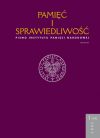Zasady i praktyka przejęcia majątku polskiego przez III Rzeszę, ze szczególnym uwzględnieniem sektora rolnego oraz mieszkaniowego
Principles and Practice of Appropriation of Polish Property by the Third Reich, Particularly in Housing and agricultural Sector
Author(s): Mirosław SikoraSubject(s): History
Published by: Instytut Pamięci Narodowej
Summary/Abstract: The author of the article presents the formal principles and practice of taking over Polish property by the German authorities in the territory annexed to the Third Reich in autumn 1939. The article focuses on the actions headed to expropriation, confiscation, temporary management and sale of the farm as well as housing and building plots. The competences (jurisdiction) of the German central and regional – civil as well as SS administration were characterized, and thereby their responsibility for carrying out the expropriation. As the example served the Polish territories, that had been incorporated to the province of Silesia (a part of which was named since January 1941 Upper Silesia). The author brings closer the individual stages of the taking over of the Polish property – from registering and estimating its amount and value, by removing of the Polish owner and the management of expropriated farm or housing plot to the selling and leasing it to a German citizen (Reichsdeutsch, Volksdeutsch, displaced person) or its nationalization. There were in Reich three persons – and at the same time three central instances with a subordinated to them regional apparatus – who had an influence on the management and redistribution of the occupied Polish (and Jewish) property: Reichsmarschall Hermann Göring as the superior of the Chief Trust Office East (Haupttreuhandstelle Ost), Reichsführer SS Heinrich Himmler as the Reich Commissioner for the Strengthening of Germandom (Reichskommissar für die Festigung des deutschen Volkstums), and the Reich Minister for Food and Agriculture (Reichsminister für Ernährung und Landwirtschaft) Richard Walter Darré (until 1942). The lack of clear-cut of jurisdiction caused frictions between these instances not only at the minister level, but also in the Region, among others in Upper Silesia. During the war Himmler was extending his influences on the control and redistribution of the occupied property, using his competences in the area of colonization of the annexed eastern territory.
Journal: Pamięć i Sprawiedliwość.
- Issue Year: 14/2009
- Issue No: 1
- Page Range: 177-200
- Page Count: 24
- Language: Polish

